Better Treatment of Work-Seekers
Our advocacy towards this goal starts with the employers who hire our members. We firmly believe that greater recruitment friendliness would not only help combat discouragement of the unemployed but also positively affect staff turnover for all employers.
These recommendations arise directly from our members'' daily experiences. They create discouragement because of the cost and effort in repetitive speculative applications. For example, Lauren Graham at University of Johannesburg established in 2016 that the average cost of actively searching for an unemployed person is R938 per month.
The unemployed are being compelled repetitively to spend on travel, copying, certifying, data, grooming and clothing for interviews, with, in each case, an exceedingly small chance of getting an opportunity. This leads discouragement and giving up looking altogether as it is unaffordable and so often fruitless.
Recruitment Friendliness Recommendations
- Conduct initial interviews where the unemployed live (e.g. at our branches). You will raise more candidates that way. Alternatively, conduct screening of candidates by phone wherever possible to reduce fruitless expenditure on travel and copying documents. Currently candidates have to cover the cost of travel, often at least twice, for an assessment and then interview (minimum R48 total for two round trips of a taxi ride). Sometimes candidates travel speculatively to stores to ask if they''re hiring.
- Accept digital versions (e.g. a smartphone photo) of ID, bank and SARS statement perhaps until candidate is hired at which point copies can be checked against originals or copies made only then. Currently, candidates have to copy and certify before knowing they''re hired - i.e. the spend and effort are almost always wasteful. Copies are approximately R1 each at libraries and the cheapest internet cafes and copy shops that are often not near the individual''s home. Certification has to be under 3 months old and so requires repeat trips to police stations which are also often not near the individual''s home..
- Pay wages with a higher frequency (daily or weekly) in the first two months to cover travel from hiring until the second payday for all staff paid up to, say, R5,000 per month. From starting training to the first payday can be up to 20 shifts or R480 at the minimum R24 per round trip - that is, if they''re not extremely lucky and can walk in to the store. We''ve noticed that our candidates miss shifts in their first month because loans to travel that they were hoping for from family and friends didn''t come through last minute. This has happened even in the second month due to the first payment often not providing the buffer needed for travel for the entire next month. The build up of financial pressure on the unemployed person during their search means they often enter employment saddled with debt to friends and family.
Township Physical Infrastructure for Cape Town
Cape Town is one of the world''s most unequal cities. It retains its Apartheid spatial layout with the poor and unemployed living in predominantly residential-only, often squalid townships and suburbs, and suffering a hugely disproportionate burden of social problems and crime.
There is an urgent need for physical infrastructure renewal and provision in the these areas of Cape Town - the rollout of which would be job creating and lead to better, safer, healthier livelihoods.
We call on the City to acknowledge that immediate action and investment are required to address extreme levels inequality, crime, poverty and various other social crises facing over half of its population. The City must use all measures at its disposal to prioritise budget, including its annual surplus and reserves for utilisation in high unemployment areas of the city to:
- build secure offices, spaces for light manufacturing, trading, training and organising
- fix the roads and pavements (e.g. so that children can walk to school safely)
- increase police presence and the funding of neighbourhood watch schemes
- improve the physical fabric of existing homes and build new homes
- provide free, reliable and full wifi coverage
- install and maintain flush toilets, overcoming resistance to the cost of expanding the sewerage system
- provide funding for organising of informal work into township trade associations
National Job Creation Policies and Funding Them
Our plan is for 16 million new jobs and a fully working society with a labour absorption rate like Thailand''s or Germany''s - 75% to 80% of the working age in work. Many of our suggestions are costly and some are hard. As such we have suggestions to fund them from changes to current budget allocation, new revenue and borrowing. Since developmental infrastructure, particularly in townships and poorer areas, returns far more than invested, public debt for such projects should be an easy choice.
- Massive increase in construction in poorer areas, including:
- 600,000 to 800,000 new homes per year for 10 years are required to clear the backlog and provide for new household formations
- improving the fabric of the existing informal housing stock
- building office space, sites for trading, light manufacturing, training and organising
- improvement of roads, pavement, drainage and street furniture
- provision of flush toilets and piped water inside homes
- more, better maintained, safe, child-friendly public spaces
- free widescale, reliable, fast wifi internet
2 to 3 million jobs - Developmental and trade infrastructure (renewable energy, clinics, schools, roads, rail, ports, mass transit etc)
1 million jobs - Agro-processing and high-value, labour-intensive agriculture (nuts, berries, avocados etc)
500,000 to 1 million jobs - Focus on export competitive services and manufacture of sophisticated products with high local content (also for local consumption)
2 million jobs - An informal trading agency with hundreds of branches in poorer communities to grow township economies. Each would liaise with member-based organisations per category of trade and offer a suite of tens of different trading activities - each coming with training, support and lending for tiny, informal businesses (e.g. fixing furniture, repairing phones, long life bags, smallholder farming, etc). As economic activity picks up in poorer areas due to urban and rural infrastructure rollout, the informal economy could flourish.
10 million jobs
 DAILY MAVERICK: An ‘extraordinary and loving’ activist – who was struggling for dignity in Gugs – has been gunned down
DAILY MAVERICK: An ‘extraordinary and loving’ activist – who was struggling for dignity in Gugs – has been gunned down DAILY MAVERICK: Unemployment for black South Africans is worse today than in 1994
DAILY MAVERICK: Unemployment for black South Africans is worse today than in 1994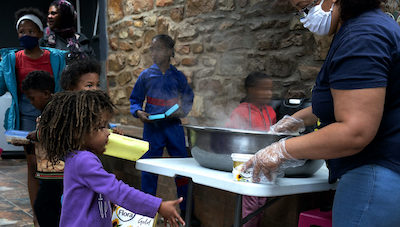 DAILY MAVERICK: Local government elections 2021 – a chance to put the ‘public’ back into public institutions
DAILY MAVERICK: Local government elections 2021 – a chance to put the ‘public’ back into public institutions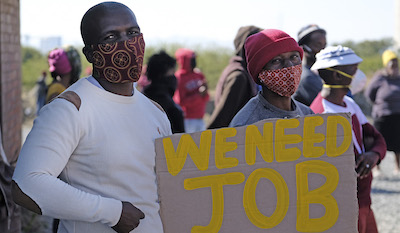 DAILY MAVERICK: Unemployment just before lockdown was worst on record and is expected to get much worse
DAILY MAVERICK: Unemployment just before lockdown was worst on record and is expected to get much worse DAILY MAVERICK: Crisis sees Cape Town suburbs reach across the great social divide
DAILY MAVERICK: Crisis sees Cape Town suburbs reach across the great social divide DAILY MAVERICK: ‘If I tell my daughter there is no hope, I am killing her’
DAILY MAVERICK: ‘If I tell my daughter there is no hope, I am killing her’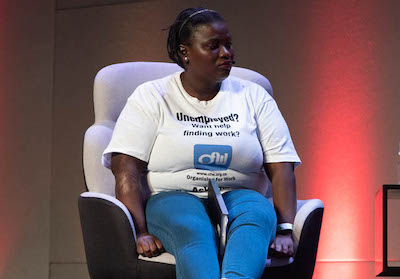 DAILY MAVERICK: Unemployment scourge: ‘The challenge is macro’ and there is hope
DAILY MAVERICK: Unemployment scourge: ‘The challenge is macro’ and there is hope WATCH: OfW Gugulethu volunteer, Pamela Silwana, on Unemployment Panel at The Daily Maverick Gathering 2020 at the CTICC
WATCH: OfW Gugulethu volunteer, Pamela Silwana, on Unemployment Panel at The Daily Maverick Gathering 2020 at the CTICC DAILY MAVERICK: Reply to Ayal Belling: We are revolutionising government’s approach to youth employment
DAILY MAVERICK: Reply to Ayal Belling: We are revolutionising government’s approach to youth employment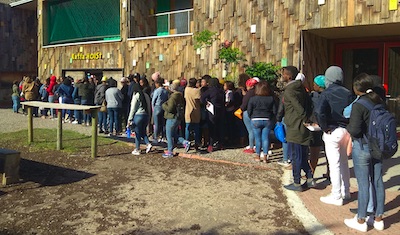 DAILY MAVERICK: Jobless youth one of Ramaphosa’s main priorities
DAILY MAVERICK: Jobless youth one of Ramaphosa’s main priorities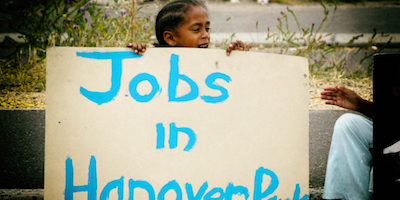 DAILY MAVERICK: South Africa's State of Unemployment Disaster
DAILY MAVERICK: South Africa's State of Unemployment Disaster LISTEN: Radio interview with John Maytham on Afternoon Drive
LISTEN: Radio interview with John Maytham on Afternoon Drive DAILY MAVERICK: Using Barack Obama’s organising model to tackle SA’s unemployment crisis
DAILY MAVERICK: Using Barack Obama’s organising model to tackle SA’s unemployment crisis